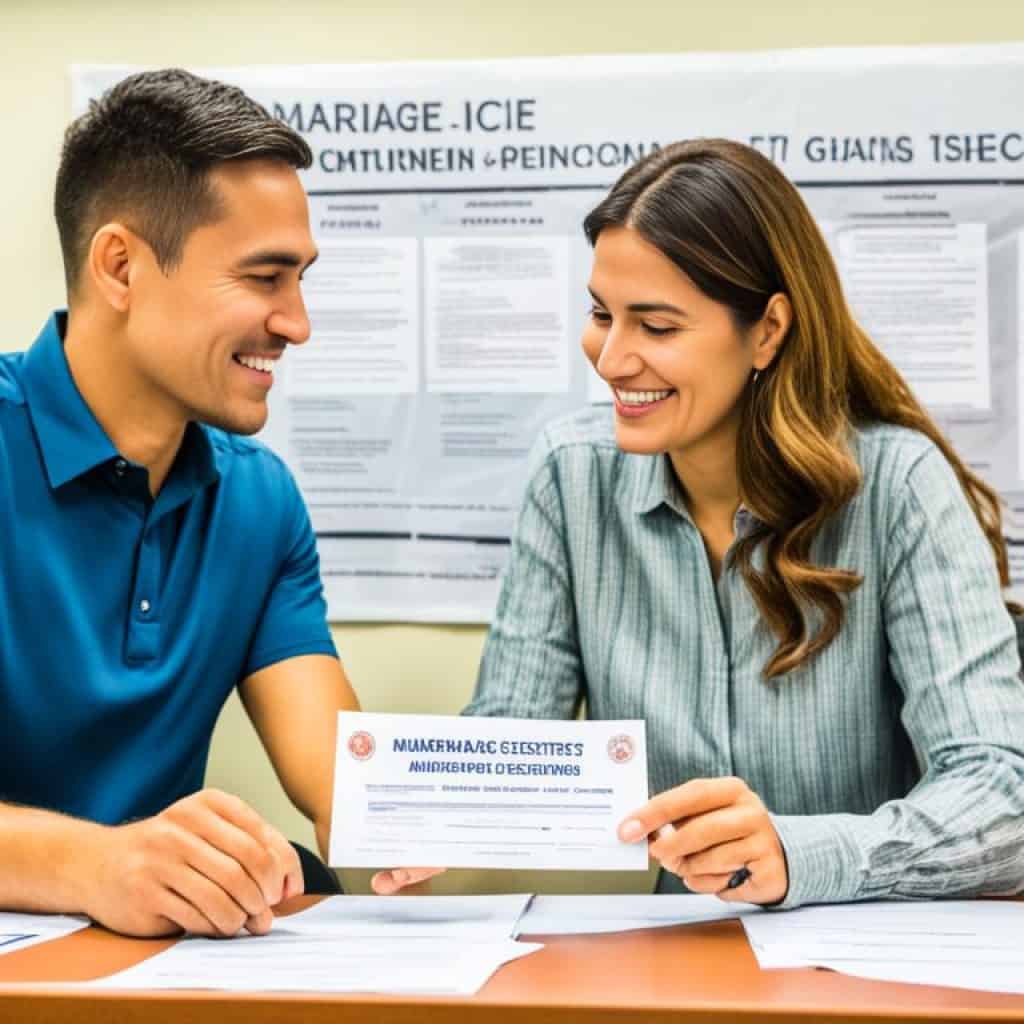Are you ready to embark on a remarkable journey of love and cultural exploration? Marrying a Filipina can open up a world of traditions, commitment, and bliss. But what does it take to find your perfect Filipina wife? And how can you navigate the process with ease?
Join us as we dive into the intricacies of finding love in the Philippines. From Filipina dating to marrying a Filipina woman, we’ll provide you with the guidance you need to make your dreams a reality. Discover the beauty of Philippine brides and the customs that come with them.
Don’t miss this chance to explore the wonders of Filipina marriage and find your lifelong partner in the Philippines. Let’s embark on this extraordinary journey together.
Key Takeaways:
- Find love in the Philippines by understanding the process of marrying a Filipina.
- Discover the rich cultural traditions that come with marrying a Filipina.
- Learn the steps and requirements for finding a wife in the Philippines.
- Uncover the beauty of Philippine brides and the commitment they bring to a marriage.
- Prepare for a lifelong journey with your Filipina wife and embrace the love and traditions that await you.
Overview of Marriage In The Philippines
Marriage in the Philippines is a significant milestone that offers both advantages and challenges. It provides expats with an opportunity to obtain permanent residency through the Philippines spousal visa. However, it is essential to be aware of the requirements outlined in the Family Code of the Philippines.
The Family Code in the Philippines establishes the legal framework for marriage and defines the rights and responsibilities of spouses. It sets forth strict guidelines that must be followed to ensure the validity and legality of the marriage. This includes requirements such as obtaining a marriage license, fulfilling the necessary documentation, and complying with the prescribed waiting period.
Despite the challenges, many expats are drawn to the Philippines to find love and get married. The country’s rich culture, warm hospitality, and picturesque landscapes make it a popular destination for couples seeking a memorable wedding. Whether it’s a beach wedding, a church ceremony, or a civil union, the Philippines offers a diverse range of options to meet every couple’s preferences.
Expats who choose to tie the knot in the Philippines not only embark on a lifelong commitment but also immerse themselves in a vibrant and unique cultural experience. The blending of traditions and customs from different cultures adds a special touch to the wedding festivities and creates lasting memories for both the couple and their loved ones.
Philippines Spousal Visa
One of the advantages of getting married in the Philippines is the opportunity to obtain a Philippines spousal visa. This visa allows the foreign spouse to stay in the Philippines and eventually apply for permanent residency. It provides a pathway to build a life together and enjoy all the benefits that come with it, including the ability to work, travel, and access healthcare services.
The process of obtaining a Philippines spousal visa involves fulfilling specific requirements and submitting the necessary documentation. These may include a marriage certificate, proof of financial capacity, medical clearance, and a valid passport. It is crucial to consult with the Bureau of Immigration or seek professional advice to ensure a smooth and successful application process.
Quick Summary - Steps To Get Married In The Philippines
If you’re planning to get married in the Philippines, it’s essential to understand the steps and requirements involved. This quick summary will guide you through the process of how to get married in the Philippines, including the necessary paperwork and arrangements. Whether you’re opting for a civil wedding or a church ceremony, these steps will help ensure a smooth and successful marriage.
- Obtain a marriage license from the Local Civil Registrar (LCR). This requires the submission of necessary documents and payment of fees. The marriage license is valid for 120 days.
- Complete a pre-marital counseling or marriage seminar conducted by the LCR. This educational program aims to provide couples with essential knowledge and guidance for a successful marriage.
- Prepare the required marriage documents for submission, including:
- Original copies of the couple’s birth certificates.
- Certificate of No Marriage (CENOMAR) to verify the single status of both parties.
- Valid identification cards of the couple, such as passports, driver’s licenses, or government-issued IDs.
- Secure any additional documents based on your specific situation. For example, if one or both of the parties were previously married, a divorce decree or annulment documents may be required.
- Schedule and plan the wedding ceremony according to your preferences. Whether it’s a civil wedding at the LCR office or a church ceremony, make sure to coordinate with the appropriate authorities and officiants.
- On the wedding day, have at least two witnesses present to sign the marriage certificate.
- After the wedding, the marriage certificate will be registered with the Local Civil Registrar, which will then issue a Marriage Certificate as proof of marriage.
Remember to check the specific requirements in the city or municipality where you plan to get married, as they may vary slightly. By following these steps and fulfilling the necessary paperwork, you’ll be on your way to a legally recognized marriage in the beautiful Philippines.
Important Note:
It’s vital to consult with the Local Civil Registrar or a legal professional to ensure compliance with all applicable requirements and procedures. Laws and regulations may change, so always seek the most up-to-date information and guidance.
What Marriage Documents Are Needed For a Civil Wedding in the Philippines?
To have a civil wedding in the Philippines, several important documents must be prepared. These documents play a crucial role in ensuring that the marriage is legally recognized and documented. Here are the key marriage documents required for a civil wedding in the Philippines:
1. Birth Certificate
For the Filipino partner, a birth certificate issued by the Philippine Statistics Authority (PSA), formerly known as the National Statistics Office (NSO), is required. This document verifies the individual’s identity and serves as proof of age and citizenship.
2. Foreigner's Birth Certificate
For the foreign partner, a birth certificate from their home country must be provided. This document serves as proof of identity, age, and citizenship. The foreigner’s birth certificate should be duly authenticated and translated into English, if necessary.
3. Certificate of No Marriage (CENOMAR)
A Certificate of No Marriage, commonly known as CENOMAR, is essential to prove the single status of both parties. This document is obtained from the PSA and confirms that there is no existing marriage or record of marriage for the individuals intending to marry.
4. Death Certificate (if applicable)
If one or both parties have been previously married and a spouse has passed away, a death certificate must be presented as proof. This document is necessary to establish the termination of the previous marriage.
5. Certificate of Legal Capacity to Contract Marriage
Foreign expats who wish to marry in the Philippines must secure a Certificate of Legal Capacity to Contract Marriage. This document serves as the equivalent of the CENOMAR for foreigners and demonstrates their eligibility to marry according to the laws of their home country.
It’s important to note that additional documents may be required depending on the specific circumstances and local government policies. To avoid any issues or delays, it’s advisable to consult with the appropriate authorities or seek legal advice.
Having all the necessary marriage documents ready ensures a smooth and hassle-free civil wedding process in the Philippines.
Required Marriage Documents for a Civil Wedding in the Philippines
| Document | Requirement |
|---|---|
| Birth Certificate | Issued by the Philippine Statistics Authority (PSA) for the Filipino partner |
| Foreigner’s Birth Certificate | From the partner’s home country, duly authenticated and translated if necessary |
| Certificate of No Marriage (CENOMAR) | To prove single status |
| Death Certificate | Only if applicable, to establish termination of previous marriage |
| Certificate of Legal Capacity to Contract Marriage | For foreign expats, equivalent to CENOMAR |

“Marriage is not just a union of two individuals; it’s a celebration of love, commitment, and legal recognition.”
Accepted Government-Issued Identification Cards
To get married in the Philippines, both partners need to present valid government-issued identification cards. It is essential to ensure that the identification cards meet the criteria set by the Philippines government. The following are some acceptable forms of identification:
- Philippine Passport
- Driver’s License
- Social Security System (SSS) ID
- Government Service Insurance System (GSIS) ID
- Professional Regulation Commission (PRC) ID
- Unified Multi-Purpose ID (UMID)
- Voter’s ID
- Postal ID
- Barangay Clearance
These are just a few examples of the acceptable government-issued identification cards in the Philippines. It is important to check with the local municipality or civil registrar regarding any specific requirements or additional acceptable IDs in your area. Here is an image highlighting some of the acceptable government-issued identification cards:
Having the proper identification cards ready will ensure a smooth process when applying for a marriage license and completing the necessary paperwork. It is advisable to bring multiple copies of the valid IDs to avoid any complications or delays.
What Additional Documents and Requirements Are Needed to Get Married in the Philippines?
In addition to the basic marriage documents, there are additional requirements for getting married in the Philippines. These additional documents and requirements are dependent on the type of wedding, whether civil or church wedding.
For a civil wedding, couples may need to provide a notarized affidavit stating their intention to marry and their eligibility to do so. This affidavit serves as proof of their civil status and is typically required by the civil registry.
If parental consent is required, couples may also need to provide a notarized affidavit from their parents or legal guardians. This is often required if one or both parties are under the age of 25.
For a church wedding, the requirements may vary depending on the religious denomination. Couples will typically need to comply with the specific requirements set by their chosen church or parish. These requirements may include attending pre-marital counseling, undergoing a marriage preparation course, obtaining the necessary clearances from the church office, and providing additional documents such as baptismal certificates, confirmation certificates, and marriage license.
It is essential for couples to consult with their chosen church or civil registry in advance to ensure they have all the necessary additional documents and requirements in place for a successful marriage in the Philippines.
Summary of Additional Documents and Requirements
| Type of Wedding | Additional Documents | Additional Requirements |
|---|---|---|
| Civil Wedding | Notarized Affidavit | Parental Consent (if required) |
| Church Wedding | Dependent on Church/Parish | Pre-marital counseling, Marriage preparation course, Church clearances, Supporting documents (e.g., baptismal certificates, confirmation certificates, marriage license) |
By fulfilling these additional documents and requirements, couples can ensure a smooth and legally recognized marriage in the Philippines.
What Are the Steps on How to Get Married in the Philippines?
Getting married in the Philippines is an exciting journey filled with love and cultural traditions. To ensure a smooth and successful marriage, it is important to follow the specific steps involved in the process. Here is a detailed guide on how to get married in the Philippines:
- Obtain a Marriage License: The first step is to secure a marriage license from the Local Civil Registrar office in the city or municipality where you or your partner resides. Both parties must personally appear and submit the required documents, such as valid identification cards, birth certificates, and a Certificate of No Marriage (CENOMAR).
- Attend Pre-Marital Classes: Before getting married, it is mandatory for couples to attend a pre-marital counseling or family planning seminar conducted by the local government or a recognized religious organization. This seminar aims to provide information on responsible parenthood, family planning, and the rights and duties of married couples.
- Choose an Officiant: Decide who will officiate your wedding ceremony. In the Philippines, you have the option to choose a judge, a mayor, a priest, or any person authorized by the government or recognized religious group to solemnize marriages.
- Plan Your Wedding Ceremony: Coordinate with your chosen officiant and organize the details of your wedding ceremony. Decide on the venue, date, and time. Whether you prefer a civil wedding or a religious ceremony, proper arrangements need to be made.
Once you have completed these steps, you are ready to celebrate your special day and embark on your journey as a married couple.

What Are the Additional Requirements for a Catholic Church Wedding in the Philippines?
If you’re dreaming of a Catholic church wedding in the Philippines, it’s important to note that there are additional requirements to fulfill. Alongside the general requirements for getting married in the Philippines, the Catholic Church has its own set of criteria for couples seeking a sacramental marriage.
Pre-Nuptial Seminar
An essential step in preparing for a Catholic church wedding is attending a pre-nuptial seminar. This seminar aims to provide couples with important insights into the sacrament of marriage and helps them understand the responsibilities and commitments involved. During the seminar, topics such as communication, conflict resolution, and the religious significance of marriage are discussed.
Canonical Interview
Before a Catholic church wedding can take place, the couple must undergo a canonical interview. This interview is conducted by the parish priest or a designated representative and serves as an opportunity for the couple to address any questions or concerns regarding their eligibility for sacramental marriage. The interview also ensures that the couple is fully aware of the sacredness and lifelong commitment of marriage.
Clearance from the Archdiocesan Chancery Office
Obtaining clearance from the Archdiocesan Chancery Office is another requirement for a Catholic church wedding in the Philippines. This clearance serves as official permission to proceed with the church wedding and must be obtained from the chancery office of the specific archdiocese where the wedding will take place.
| Additional Requirements for a Catholic Church Wedding in the Philippines |
|---|
| Attendance at a pre-nuptial seminar |
| Undergoing a canonical interview |
| Obtaining clearance from the Archdiocesan Chancery Office |
Please note that these additional requirements vary slightly depending on the specific diocese and church where the wedding will be held. It’s crucial for couples to contact the church in advance to inquire about any specific guidelines or additional documents that may be needed.
In the Philippines, there are legal restrictions on certain types of marriages. It is important to understand these restrictions before planning to get married in the country. The following are the types of marriages that are not allowed:
- Marriages between relatives
- Same-sex marriages
- Manipulated marriages
Marriages between close relatives, such as siblings, parents and children, and other blood relatives, are prohibited in the Philippines. This restriction is in place to prevent potential genetic disorders that can arise from these unions.
In addition, same-sex marriages are not recognized in the Philippines. The country follows a conservative approach to marriage laws, and same-sex couples are not legally allowed to marry.
Manipulated marriages, where one or both parties enter into the marriage under coercion or deception, are also not allowed. The Philippines values the concept of free will and consent in marriage, and any marriage that is not entered into willingly and honestly is considered prohibited.
These legal restrictions on marriage are in place to protect the institution of marriage and ensure the well-being of individuals involved. It is important to respect and adhere to these laws when considering marriage in the Philippines.
Understanding the Legal Restrictions
“Marriage is a sacred union that should be based on love, trust, and honest commitment. By prohibiting marriages between relatives, same-sex couples, and manipulated marriages, the Philippines aims to protect the integrity of this institution.” – Legal Expert
While these restrictions may limit some individuals from getting married, they reflect the cultural and legal framework of the Philippines. It is essential to be aware of these legal restrictions and plan your marriage accordingly.
| Prohibited Marriages | Legal Restrictions |
|---|---|
| Marriages between relatives | To prevent potential genetic disorders |
| Same-sex marriages | Conservative approach to marriage laws |
| Manipulated marriages | Value of free will and consent in marriage |
Does the Philippines Have Common-Law Marriage?
The Philippines does recognize common-law marriage under certain circumstances. A common-law marriage, also known as a de facto marriage, refers to a union between two individuals who have not undergone a formal wedding ceremony but have established a marital-like relationship and live together as spouses. While common-law marriage is not explicitly provided for in Philippine law, legal recognition is given to such relationships if specific requirements are met.
To be considered in a common-law marriage in the Philippines, the following conditions must be satisfied:
- The couple must have lived together for a continuous and uninterrupted period of at least five years.
- They must have a public declaration of their marital status as husband and wife.
- They must possess the legal capacity to marry each other.
It is important to note that common-law marriage is not automatic and requires evidence to establish its existence. Couples must provide supporting documentation, such as joint ownership of property, joint bank accounts, and affidavits from friends and family attesting to their marital relationship.
It is crucial to consult with a legal professional to understand the specific legalities and implications of common-law marriage in the Philippines.
| Benefits of Common-Law Marriage in the Philippines | Responsibilities of Common-Law Marriage in the Philippines |
|---|---|
| 1. Property ownership rights | 1. Financial obligations and support |
| 2. Inheritance rights | 2. Shared responsibilities in raising children |
| 3. Insurance benefits | 3. Legal obligations in cases of separation or dissolution |
Can Two Foreigners Get Married in the Philippines?
Yes, two foreigners can get married in the Philippines if they meet the necessary requirements. The process for foreigners getting married in the Philippines is fairly straightforward, although certain documents and steps must be followed. Here’s an outline of the specific requirements and process:
Requirements for Foreigners Getting Married in the Philippines
- Valid Passport: Both partners must have valid passports. Ensure that your passport has at least six months’ validity remaining. t
- Certificate of Legal Capacity to Contract Marriage: This document, also known as a CENOMAR, verifies that you are legally eligible to marry. Foreigners can obtain this document from their respective embassies or consulates in the Philippines. It should be noted that some embassies may require additional documents, so it’s essential to check with your embassy beforehand. t
- Birth Certificate and Valid ID: Foreign partners must present their birth certificate and a valid identification card issued by their home country. These documents serve as proof of identity and eligibility for marriage.
- Marriage License: To obtain a marriage license, both partners must apply together at the Local Civil Registry Office in the city or municipality where the marriage will take place. The marriage license serves as legal permission to be married and is commonly valid for 120 days. t
- Civil Wedding Ceremony: Once the necessary documents are obtained, the couple can proceed to have a civil wedding ceremony. The ceremony can take place in a government office or any venue authorized to conduct civil weddings.
Process for Getting Married as Two Foreigners in the Philippines
- t
- Obtain the required documents: Gather all the necessary documents, including a valid passport, birth certificate, valid identification card, and Certificate of Legal Capacity to Contract Marriage. t
- Visit your embassy or consulate: Go to your embassy or consulate in the Philippines to obtain the Certificate of Legal Capacity to Contract Marriage. Follow the specific requirements and procedures set by your embassy. t
- Apply for a marriage license: Go to the Local Civil Registry Office in the city or municipality where you plan to get married. Submit the required documents and apply for a marriage license. t
- Attend the civil wedding ceremony: Once the marriage license is issued, schedule a civil wedding ceremony at the designated venue. The ceremony will be conducted by a judge or any person authorized by the government to solemnize marriages.
Getting married as two foreigners in the Philippines is an exciting opportunity to celebrate your love in a beautiful setting. By understanding the requirements and following the necessary steps, you can have a memorable and legally recognized marriage in the Philippines.

| Requirements | ttDocuments | ttProcess | t
|---|---|---|
| Valid Passport | ttPassport with at least 6 months validity | ttPresent valid passports | t
| Certificate of Legal Capacity to Contract Marriage | ttCENOMAR (obtained from embassy or consulate) | ttObtain CENOMAR from embassy | t
| Birth Certificate and Valid ID | ttBirth certificate, valid ID from home country | ttPresent birth certificate and valid ID | t
| Marriage License | ttApplication at Local Civil Registry Office | ttApply for marriage license | t
| Civil Wedding Ceremony | ttAuthorized venue | ttSchedule and attend civil wedding ceremony | t
Key Takeaway: How-To Get Married In The Philippines
Getting married in the Philippines is an exciting adventure that combines love, culture, and commitment. To help you navigate this journey, here is a summary of the key takeaways and essential requirements for getting married in the Philippines:
Marriage Requirements:
- Valid government-issued identification cards for both partners
- Birth certificate issued by the Philippine Statistics Authority (PSA) for the Filipino partner
- Foreign partner’s birth certificate
- Certificate of No Marriage (CENOMAR) to prove single status
- Death certificate (if applicable)
- Certificate of Legal Capacity to Contract Marriage for foreign expats
Additional Documents and Requirements:
Aside from the basic marriage documents, there may be additional requirements depending on your specific situation. These may include notarized affidavits, parental consent under certain circumstances, and specific requirements for a church wedding.
Steps to Get Married:
- Obtain a marriage license from the local civil registrar’s office
- Attend pre-marital classes or seminars
- Choose an officiant or solemnizing officer
- Plan and have your wedding ceremony
| Marriage Requirements | Additional Documents and Requirements | Steps to Get Married |
|---|---|---|
| – Valid government-issued IDs – Birth certificates – CENOMAR – Death certificates (if applicable) – Certificate of Legal Capacity to Contract Marriage for foreign expats | – Notarized affidavits – Parental consent (if needed) – Church wedding requirements | – Obtain a marriage license – Attend pre-marital classes – Choose an officiant – Have the wedding ceremony |
Remember, marriage in the Philippines requires careful preparation and adherence to the necessary requirements. By following these key takeaways, you can ensure a smooth and successful marriage in the beautiful country of the Philippines.
Conclusion
Marrying a wife from the Philippines is a significant and rewarding experience. It offers the opportunity to find love in the Philippines while embracing the rich cultural traditions of the country. The commitment in marriage is strengthened by the unique bond formed between partners from different backgrounds.
This guide has provided all the necessary information and steps to ensure a successful marriage in the Philippines. From understanding the requirements to following the process, you can embark on a lifelong journey with your Filipina wife, embracing the customs and values that make your relationship special.
| Marrying a wife from the Philippines | Finding love in the Philippines | Cultural traditions in the Philippines | Commitment in marriage |
|---|---|---|---|
| Explore the unique journey | Discover love in a diverse culture | Embrace traditions and customs | Strengthen your commitment |
| Learn the steps to marry a Filipina | Experience the warmth of Filipino relationships | Participate in cultural celebrations | Build a strong foundation for your marriage |
| Understand the legal requirements | Find your soulmate in the Philippines | Learn about Filipino values and beliefs | Nurture a lifelong partnership |
By following this guide, you can ensure a smooth and successful marriage in the Philippines, creating a strong foundation for the future. Embrace the beauty of marrying a wife from the Philippines and embark on a fulfilling journey filled with love, cultural exploration, and commitment.
Other Guides On Expat Life In The Philippines
1. Guide to Expat Living in the Philippines: This comprehensive guide offers valuable information on various aspects of expat life in the Philippines, including finding accommodation, navigating the local healthcare system, and understanding the cost of living. It provides practical tips and advice to help you settle in and make the most of your time in this beautiful country.
2. Expat’s Guide to Philippine Culture: Immerse yourself in the rich cultural heritage of the Philippines with this guide. It covers topics such as Filipino traditions, festivals, and cuisine, giving you a deeper understanding of the local customs and helping you connect with the vibrant Filipino community.
3. Financial Guide for Expats in the Philippines: Managing your finances can be a crucial aspect of expat life. This guide provides insights into banking options, sending money internationally, and understanding the local tax system. It aims to help you navigate the financial landscape and make informed decisions for a secure and prosperous life in the Philippines.
By referring to these guides, you can gain valuable knowledge and insights that will enhance your expat experience in the Philippines. Whether you are looking for practical tips, cultural insights, or financial advice, these resources will help you make the most of your time living in this vibrant and welcoming country.
FAQ
What are the benefits of marrying a wife from the Philippines?
Marrying a Filipina offers a unique journey that combines love and cultural exploration. It also provides an easy path to permanent residency through the Philippines spousal visa.
What are the requirements for getting married in the Philippines?
The requirements for a civil wedding in the Philippines include birth certificates for both partners, a Certificate of No Marriage (CENOMAR) to prove single status, and a Certificate of Legal Capacity to Contract Marriage for foreign expats.
What documents are needed for a civil wedding in the Philippines?
The necessary documents for a civil wedding in the Philippines include birth certificates, a Certificate of No Marriage (CENOMAR), and a Certificate of Legal Capacity to Contract Marriage for foreign expats.
What are the acceptable forms of identification for getting married in the Philippines?
Valid government-issued identification cards, such as passports or driver’s licenses, are acceptable forms of identification for getting married in the Philippines.
Are there additional documents and requirements for getting married in the Philippines?
Yes, additional requirements may include notarized affidavits, parental consent in some cases, and specific requirements for a church wedding.
What is the step-by-step process of getting married in the Philippines?
The process involves obtaining a marriage license, attending pre-marital classes, choosing an officiant, and having the wedding ceremony.
Are there additional requirements for a Catholic church wedding in the Philippines?
Yes, there are additional requirements for a Catholic church wedding, such as attending a pre-nuptial seminar, undergoing a canonical interview, and obtaining clearance from the Archdiocesan Chancery Office.
What types of marriages are not allowed in the Philippines?
Marriages between relatives, same-sex couples, and manipulated marriages are not allowed in the Philippines.
Does the Philippines recognize common-law marriage?
Yes, the Philippines recognizes common-law marriage under certain conditions.
Can two foreigners get married in the Philippines?
Yes, two foreigners can get married in the Philippines as long as they meet the necessary requirements.
What are the key takeaways for getting married in the Philippines?
The key takeaways include understanding the requirements, obtaining the necessary documents, and following the step-by-step process to ensure a successful marriage in the Philippines.
Source Links
- https://nomadicfire.com/getting-married-in-the-philippines
- https://www.fickeymartinezlaw.com/immigration/consular-processing/us-citizens-guide-to-marrying-in-the-philippines-and-immigrating-a-philippine-filipina-spouse-to-the-united-states
- https://www.travelvisapro.com/blog/passports/how-to-get-married-in-philippines-as-a-u-s-citizen







Add comment